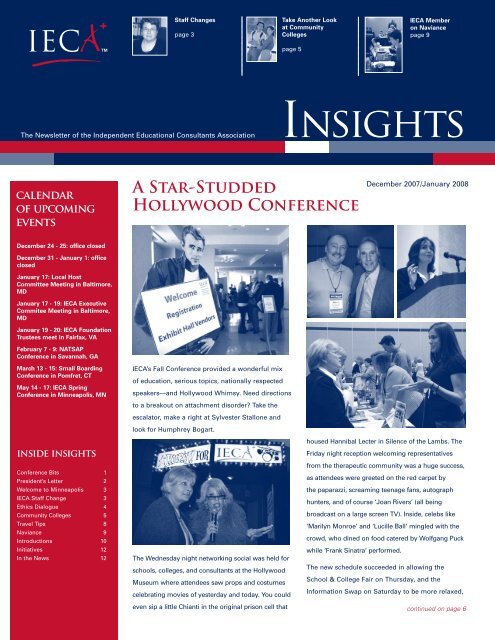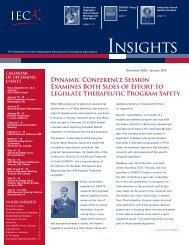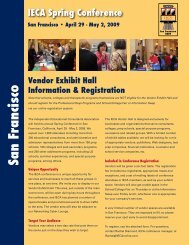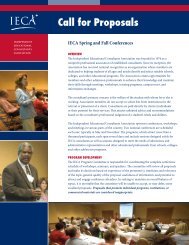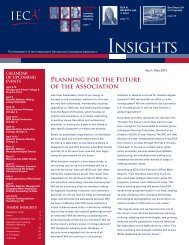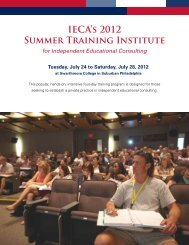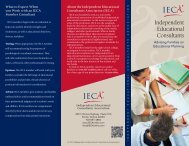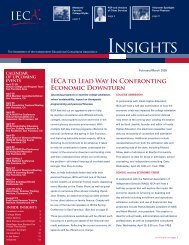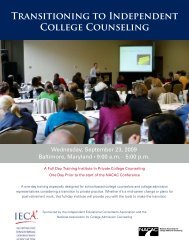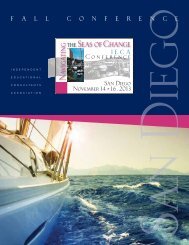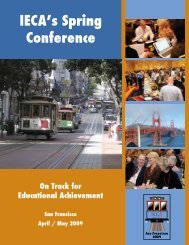Insights - IECA
Insights - IECA
Insights - IECA
Create successful ePaper yourself
Turn your PDF publications into a flip-book with our unique Google optimized e-Paper software.
The Newsletter of the Independent Educational Consultants Association <strong>Insights</strong><br />
calendar<br />
of upcoming<br />
events<br />
December 24 - 25: office closed<br />
December 31 - January 1: office<br />
closed<br />
January 17: Local Host<br />
Committee Meeting in Baltimore,<br />
MD<br />
January 17 - 19: <strong>IECA</strong> Executive<br />
Commitee Meeting in Baltimore,<br />
MD<br />
January 19 - 20: <strong>IECA</strong> Foundation<br />
Trustees meet in Fairfax, VA<br />
February 7 - 9: NATSAP<br />
Conference in Savannah, GA<br />
March 13 - 15: Small Boarding<br />
Conference in Pomfret, CT<br />
May 14 - 17: <strong>IECA</strong> Spring<br />
Conference in Minneapolis, MN<br />
inside insights<br />
TM<br />
Conference Bits 1<br />
President’s Letter 2<br />
Welcome to Minneapolis 3<br />
<strong>IECA</strong> Staff Change 3<br />
Ethics Dialogue 4<br />
Community Colleges 5<br />
Travel Tips 8<br />
Naviance 9<br />
Introductions 10<br />
Initiatives 12<br />
In the News 12<br />
Staff Changes<br />
page 3<br />
<strong>IECA</strong>’s Fall Conference provided a wonderful mix<br />
of education, serious topics, nationally respected<br />
speakers—and Hollywood Whimsy. Need directions<br />
to a breakout on attachment disorder? Take the<br />
escalator, make a right at Sylvester Stallone and<br />
look for Humphrey Bogart.<br />
The Wednesday night networking social was held for<br />
schools, colleges, and consultants at the Hollywood<br />
Museum where attendees saw props and costumes<br />
celebrating movies of yesterday and today. You could<br />
even sip a little Chianti in the original prison cell that<br />
Take Another Look<br />
at Community<br />
Colleges<br />
page 5<br />
A Star-Studded<br />
Hollywood Conference<br />
<strong>IECA</strong> Member<br />
on Naviance<br />
page 9<br />
December 2007/January 2008<br />
housed Hannibal Lecter in Silence of the Lambs. The<br />
Friday night reception welcoming representatives<br />
from the therapeutic community was a huge success,<br />
as attendees were greeted on the red carpet by<br />
the paparazzi, screaming teenage fans, autograph<br />
hunters, and of course ‘Joan Rivers’ (all being<br />
broadcast on a large screen TV). Inside, celebs like<br />
‘Marilyn Monroe’ and ‘Lucille Ball’ mingled with the<br />
crowd, who dined on food catered by Wolfgang Puck<br />
while ‘Frank Sinatra’ performed.<br />
The new schedule succeeded in allowing the<br />
School & College Fair on Thursday, and the<br />
Information Swap on Saturday to be more relaxed,<br />
continued on page 6
PRESIDENT’S LETTER<br />
Hollywood Review<br />
What a fantastic conference we had in<br />
Hollywood! Our keynote speakers were<br />
dynamic, our featured presenters were terrific,<br />
and our breakout and discussion sessions<br />
were most educational. By all measures the<br />
conference was a huge success.<br />
This conference was our first using a<br />
new format. We had heard from many of<br />
you over the last several years that our<br />
conferences grew so large and popular<br />
that the opportunity to connect and<br />
network with each other was becoming<br />
harder and harder. Our success at running<br />
conferences was creating new challenges.<br />
Mark Sklarow, our executive director, began<br />
exploring different scenarios and options<br />
about how we might address these issues.<br />
Simultaneously, our strategic planning<br />
committee was examining our conference<br />
schedule and format as well. In order to<br />
continue to provide high-quality experiences<br />
that would attract colleges, schools, and<br />
programs as well as consultants to attend<br />
our conferences, we knew something had<br />
to change.<br />
Published by:<br />
Independent Educational<br />
Consultants Association<br />
<strong>Insights</strong><br />
3251 Old Lee Highway, Suite 510<br />
Fairfax, Virginia 22030<br />
Phone: 703-591-4850<br />
Fax: 703-591-4860<br />
www.<strong>IECA</strong>online.com<br />
e-mail: info@<strong>IECA</strong>online.com<br />
President: Timothy B. Lee<br />
Executive Director: Mark H. Sklarow<br />
Editor: Sarah S. Brachman<br />
Design and Layout: Sarah S. Cox<br />
Our opening reception at the Hollywood<br />
History Museum in the old Max Factor<br />
building provided a wonderful venue to<br />
begin the first portion of our conference.<br />
There were almost equal numbers of<br />
consultants as there were college, school,<br />
and post-secondary representatives.<br />
On Friday consultants and special needs<br />
programs were treated to a Hollywood<br />
style premiere. Actors, actresses, and<br />
“celebrities” mingled with the crowd,<br />
entertaining us all. As with other events<br />
throughout the conference, the smaller<br />
numbers allowed for more interaction and<br />
greater opportunity to network.<br />
Our new format also clearly benefited our<br />
School and College Fair, and our therapeutic<br />
IN FOCuS<br />
Feedback from Hollywood<br />
Conference Evaluations<br />
Responses from Consultants Only (see<br />
responses from school, program, college<br />
and exhibitor attendees in the next issue<br />
of <strong>Insights</strong>)<br />
Considering the two conference socials<br />
(Wednesday evening for schools,<br />
colleges & consultants; and Friday<br />
evening for special needs programs and<br />
consultants) rather than one single event<br />
for all 1,200 attendees:<br />
New Split Format was better: 65%<br />
Old Format was better: 16%<br />
About the same: 19%<br />
Rating the Thursday Morning School &<br />
College Fair:<br />
Poor/Fair: 14%<br />
Good/Great: 86%<br />
Rating the Saturday Special Needs Swap:<br />
Poor/Fair: 22%<br />
Good/Great: 78%<br />
focused Information Swap. Consultants<br />
were able to spend more time at each table<br />
learning about key features of a college,<br />
particular strengths of a school, or where<br />
the focus of a therapeutic program was.<br />
Because we were able to linger longer,<br />
more meaningful dialogue occurred. Many<br />
attendees reported that each of the swaps<br />
was the best they had been to in years.<br />
continued on page 7<br />
Comparing the “Old” Format and the<br />
“New” this first time out:<br />
(percentage of consultants agreeing with<br />
the statement...)<br />
46% Format improved my ability to<br />
network<br />
27% Format hurt my ability to<br />
network<br />
63% Swap/Fairs were less crowded<br />
and helped me to really communicate<br />
3% Swap/Fairs felt empty and were<br />
less valuable to me<br />
73% Schedule seemed to reduce<br />
overcrowding<br />
34% There should be some moment<br />
when everyone is attending the same<br />
event<br />
21% New schedule left me confused<br />
2 <strong>IECA</strong> INSIGHTS December 2007/January 2008
Welcome to Minneapolis!<br />
by Valerie Broughton (MN)<br />
I just got home from Los Angeles and<br />
believe me, I’m glad to be in Minneapolis.<br />
There’s no smog here, the sun is shining<br />
and although it’s the 13th of November,<br />
it’s 60 degrees. I asked <strong>IECA</strong> folks in Los<br />
Angeles what they thought of when they<br />
thought of Minneapolis. Here were some<br />
of their replies: cold, Minnesota Twins,<br />
Mall of America, Jesse Ventura, Lake<br />
Wobegon, Mary Tyler More, Mississippi<br />
River and bratwurst (no, that’s Milwaukee!),<br />
and cold. The average high temperature<br />
in Minneapolis in May is 68 degrees. My<br />
garden will be planted by the time you come<br />
to town for the <strong>IECA</strong> conference.<br />
Twin Cities is the nickname for the two<br />
largest cities in Minnesota: Minneapolis<br />
and St. Paul. They’re separated by the<br />
Mississippi River. The university of<br />
Minnesota is one big campus with parts in<br />
each city, twin campuses if you will. The<br />
We are pleased to announce that we have<br />
a new administrative assistant at <strong>IECA</strong>’s<br />
national office. Priscilla Weeks has left to<br />
pursue new directions in association work,<br />
and we wish her well. We expect her to stay<br />
in touch as she’s indicated that she’ll miss<br />
<strong>IECA</strong> staff and members.<br />
Sheila Kirk has taken<br />
over the front desk<br />
duties. She holds a<br />
B.A. in English from<br />
Eureka College in<br />
Illinois. She moved to<br />
Virginia in 1991 and<br />
joined the staff at the Foxcroft School in<br />
Middleburg as the administrative assistant<br />
in the admission office. She worked there<br />
uM conducted groundbreaking research<br />
investigating the similarities and differences<br />
between twins, from birth to death. Our<br />
baseball team is none other than the<br />
Minnesota Twins. There are 2.8 million<br />
people in the Twin Cities.<br />
The economic history of the ‘Cities’ includes<br />
flour-milling and river traffic, and now<br />
includes General Mills, 3M, Cargill, Target,<br />
Best Buy, and Medtronic. Minneapolis is<br />
home to the Hedberg Map Company that so<br />
many of us depend on to help our families<br />
find where colleges are located. Oh, don’t<br />
forget SPAM from Hormel. Plus, Minneapolis<br />
is second only to NYC in per capita theater,<br />
museums and art exhibits.<br />
Here are some Minnesota firsts:<br />
•<br />
•<br />
•<br />
•<br />
Pop-up Toaster<br />
Water skis<br />
Packaged cake mix<br />
Walk-behind snow thrower<br />
Staff Change at the National Office<br />
for over 15 years. Sheila will answer <strong>IECA</strong>’s<br />
phones, manage payments, mail, and<br />
other administrative duties. She arrives at<br />
<strong>IECA</strong> already understanding educational<br />
consulting, students and families. She<br />
Pacemaker<br />
Rollerblades<br />
<strong>IECA</strong> National Office<br />
Phone: 703-591-4850<br />
Executive Director<br />
Mark Sklarow<br />
ext. 12<br />
MSklarow@<strong>IECA</strong>online.com<br />
Director of Education & Information<br />
Systems<br />
Sue Studnicki DePra<br />
ext. 15<br />
Sue@<strong>IECA</strong>online.com<br />
December 2007/January 2008 <strong>IECA</strong> INSIGHTS 3<br />
•<br />
•<br />
There are 17 private colleges in Minnesota<br />
and two huge public colleges and university<br />
systems. They all want to meet you!<br />
The conference hotel is connected to<br />
virtually every restaurant, shopping, and hot<br />
spot in downtown Minneapolis through the<br />
pedestrian skyway system that will allow<br />
attendees to see the sites of Minneapolis<br />
regardless of the weather.<br />
The <strong>IECA</strong> leadership and your colleagues<br />
here in Minnesota are planning a great<br />
conference. Start planning your trip to the<br />
Twin Cities for the <strong>IECA</strong>’s Spring Conference<br />
today!<br />
NOTE: Watch for information in January on<br />
a pre-conference tour of Minnesota Colleges<br />
and a post-conference COWS (Colleges of<br />
Wisconsin) tour!<br />
feels like the position was tailor-made for<br />
her, and we feel the same way! Sheila can<br />
be reached at 703-591-4850, ext. 10, or<br />
Sheila@<strong>IECA</strong>online.com.<br />
Manager of Member Services<br />
Janice Berger<br />
ext. 13<br />
Janice@<strong>IECA</strong>online.com<br />
Manager of Communications<br />
Sarah Brachman<br />
ext. 11<br />
Sarah@<strong>IECA</strong>online.com<br />
Administrative Assistant<br />
Sheila Kirk<br />
ext. 10<br />
Sheila@<strong>IECA</strong>online.com
ETHICS CASE STuDY<br />
Case of the Too<br />
Little, Too Much<br />
Jackson joined <strong>IECA</strong> four years ago after a long career as a schoolbased<br />
college counselor. In his nearly 20 years at the suburban,<br />
private, ‘Country Day,’ he worked with more than 800 students<br />
of which 90% went to college. unlike many of his colleagues in<br />
independent schools, Jackson always emphasized “fit” despite<br />
parent pressure for name-brand schools. On two occasions he was<br />
named “Outstanding School Counselor” in the state.<br />
Since joining <strong>IECA</strong> he has discovered the difficulty of building<br />
a private practice in a part of the country where consultants are<br />
nearly unheard of. After hiring a business consultant it became<br />
clear that in order to make his practice financially viable, he would<br />
need to expand his services to include placements for students<br />
In the matter of ethics, appearance is as<br />
important as substance. We need to seem<br />
ethical as well as be ethical. Any activity<br />
that doesn’t pass both tests is something we<br />
shouldn’t do, whether there’s a rule about it<br />
or not.<br />
Our Principles of Good Practice formalize this<br />
notion by defining some behaviors that are and<br />
are not acceptable to <strong>IECA</strong> as an association.<br />
The purpose of his gathering was to 1) create<br />
an opportunity for him and his prospectguests<br />
to shmooze with admissions people<br />
and 2) increase his stature with them.<br />
First, I don’t see any obligation on Sam’s part<br />
to include consultant-colleagues. While we all<br />
want good relationships with colleagues, we<br />
are, in fact *independent*, meaning we’re in<br />
business for ourselves. And we can invite (or<br />
not) whomever we want.<br />
Second, prospects and clients assume that<br />
Sam has relationships with colleges, meaning<br />
that the consultant knows people and knows<br />
how to do business with them. This in itself<br />
does not imply an ‘in’ but only that they know<br />
and trust one another. By inviting them to his<br />
house, Sam can help cement that relationship.<br />
And, it seems to me that hosting them does<br />
not, in and of itself, imply an ‘in.’<br />
That said, Sam’s statements and actions<br />
have to pass the “sniff test.” If Sam claims or<br />
implies that he gets special treatment (or even<br />
fails to contradict any inference he comes<br />
across), then that constitutes a violation of the<br />
PGP. And I would include indirect statements<br />
here. For example, if he were to claim that<br />
90% of his clients get into their first choice<br />
college, that’s tantamount to saying ‘I get<br />
people in,’ which is also a clear violation.<br />
In other words, the tune matters as much as<br />
the words. The Tobacco Association faced this<br />
demonstrating oppositional or self-destructive behaviors. This being<br />
new, Jackson began attending breakouts at <strong>IECA</strong> meetings relating<br />
to ODD, attachment disorders and much more. He attended last<br />
year’s NATSAP gathering and has gone on a little over a dozen<br />
program visits. He also requested and was assigned an <strong>IECA</strong> mentor<br />
who specializes in therapeutic placements.<br />
In March a family approached him for assistance. He knows the<br />
family well, having advised two of their children on college selection.<br />
Now the family came with a different sort of case: their youngest son<br />
seemed to be spiraling out of control, influenced by a peer group<br />
the parents objected to, grades falling to the point that moving on to<br />
11th grade was unlikely and there was every reason to believe the<br />
boy was selling his ADD medications while experimenting with illegal<br />
drugs. The family struggled with seeking help outside of the family,<br />
but came to Jackson because of his long relationship with them. A<br />
well-connected and recognizable name in political circles, the family<br />
insisted that they be protected from outside eyes and ears.<br />
Response to last month’s ethics case study<br />
(October Case Study: Consultant hosted admission representatives for cocktails and dinner at his home.)<br />
From Dodge Johnson (PA) [name printed with permission]<br />
continued on page 7<br />
squarely when they said that all models in<br />
cigarette advertising have to be over 21—and<br />
look it.<br />
Third, cost might be a problem. As <strong>IECA</strong><br />
members, we agree not to accept gifts costing<br />
more than $50, which makes possible for us<br />
to accept token gifts which aren’t valuable<br />
enough to buy us off and which it would be<br />
churlish to refuse. But when you get into<br />
expensive gifts—a diamond tiara, a cruise on<br />
the Sea Cloud—we’re in the same position as<br />
congressmen who accept cash from lobbyists.<br />
Despite how clean we may believe we are, we<br />
risk implying that we can be bought.<br />
My own feeling is that the same principles<br />
should govern the reverse. We should<br />
avoid parties that are expensive in and of<br />
themselves. I don’t know how much Sam<br />
spent on his farrago. But I hope it was less<br />
than $50 a head.<br />
4 <strong>IECA</strong> INSIGHTS December 2007/January 2008
Community Colleges: Take Another Look!<br />
by Heather Ricker-Gilbert, <strong>IECA</strong> associate member (CT)<br />
As I walk down the hall of the community<br />
college where I work, I sense a new energy<br />
as I weave my way through crowds of<br />
students who are talking, flirting, text<br />
messaging, and sitting on the floor studying.<br />
This new energy emanates from 18-yearolds<br />
who are coming to community colleges<br />
in greater numbers than ever before. Fifty<br />
percent of all undergraduates in this country<br />
are enrolled in a community college. I<br />
am a college admissions consultant and I<br />
teach at Manchester Community College<br />
in Connecticut where, for example, 81% of<br />
the full-time students are 21 or younger.<br />
As the population of students at all<br />
public institutions increases, community<br />
colleges are becoming more popular. An<br />
article published in the Washington Post<br />
(March 2004) states: “Whether shut out of<br />
universities in a competitive admissions<br />
climate or turned off by their soaring costs<br />
and oversized classes, unprecedented<br />
numbers of ambitious, high-achieving<br />
students are shrugging off the ‘13th grade’<br />
stigma and going to community colleges.” A<br />
community college used to be the last choice<br />
for students entering college. Now, for many<br />
students and their parents, it is the first stop<br />
on the way to a four-year degree.<br />
What community colleges provide are<br />
extensive support services, reasonable<br />
tuition, the chance to mature and explore<br />
academic and career options, and the ability<br />
to transfer credits. By design, community<br />
colleges have an “open door policy.”<br />
Students of all abilities are offered access to<br />
a college education. Therefore, the staff at<br />
community colleges work very hard to help<br />
students be successful through counseling<br />
and career services, tutoring and learning<br />
centers, developmental courses and ESL<br />
classes. Students who have not been<br />
academically successful in high school may<br />
find the extra support they need at their local<br />
community college.<br />
In a January 28, 2007 article, the Washington<br />
Post writes: “As the price of college has<br />
skyrocketed, millions of middle- and uppermiddle<br />
class families…have juggled to find<br />
ways to keep pace...” One of the ways is to<br />
attend a community college at a discount<br />
from what four full years at a baccalaureate<br />
institution costs. For example, annual<br />
in-state tuition at the campuses of Northern<br />
Virginia Community College is $2,430. At<br />
The College of William and Mary it is $8,490,<br />
plus room and board. An in-state Virginia<br />
student who chooses to first take his general<br />
education courses at the community college<br />
and earn an associate degree will spend<br />
approximately $4,812 for two years of course<br />
work. If he is qualified, he can then go on to<br />
earn a degree from William and Mary having<br />
saved $12,120 on his total tuition bill. Jess<br />
Batchelor, a columnist for the Manchester<br />
Community College student paper the Live<br />
Wire, questioned...“Does going to a fouryear<br />
college immediately after graduating<br />
from high school really make you thousands<br />
of dollars smarter?”<br />
In addition to saving students from paying<br />
mounting tuition fees, taking on loans,<br />
and accumulating huge debts, community<br />
colleges allow students to explore and decide<br />
what they might like to do academically<br />
and professionally. Penn State professor Dr.<br />
Kenneth Gray, who spoke at the <strong>IECA</strong> fall<br />
2005 conference and the author of Other<br />
Ways to Win, notes, “A four year college is an<br />
expensive place to make career decisions.”<br />
For the 18-year-old who is not academically<br />
confident or who is not quite sure whether he<br />
wants a career in criminal justice, psychology,<br />
business, early childhood education, or<br />
electronic music, a community college makes<br />
sense. Most community colleges offer a wide<br />
array of both applied and Liberal Arts and<br />
Science courses and majors.<br />
For some who did not excel in high school,<br />
coming to a local community college with<br />
small classes and personal attention will<br />
give them a chance to improve their grades<br />
and gain admission to a four-year college of<br />
their choice. Currently, many private colleges<br />
are looking for economic diversity, and<br />
they aggressively recruit capable students<br />
from community colleges. For example,<br />
Amherst, Mount Holyoke, and Wesleyan<br />
regularly attend college transfer fairs at<br />
my community college. Another advantage<br />
of community colleges is that they offer<br />
many programs that train students to go<br />
to work with a two-year associate degree<br />
in specialized areas such as hospitality<br />
management, computer programming,<br />
graphic design, surgical technology, or<br />
dental hygiene.<br />
For those who eventually want to earn<br />
a bachelor’s degree, community college<br />
credits transfer to most four-year colleges,<br />
continued on page 7<br />
December 2007/January 2008 <strong>IECA</strong> INSIGHTS 5
Conference, from page 1<br />
spacious, and<br />
gave attendees the<br />
opportunity for real<br />
communication.<br />
The schedule<br />
changes also<br />
resulted in only<br />
consultants with<br />
appropriate<br />
specialties and<br />
those representing<br />
such placements<br />
attending each<br />
event. The<br />
reduction in<br />
attendees present<br />
at one time, from 1,200 to 750, meant that those in the room were<br />
directly interested and involved in that event’s focus. In the end,<br />
more than 200 consultants who specialize in school and college<br />
placement walked the hall on Thursday morning and well over<br />
100 consultants who specialize in therapeutic and special needs<br />
placements attended the event Saturday.<br />
Four keynoters in four days brought nationally recognized<br />
figures to the conference and many featured breakout presenters<br />
could easily have warranted keynoter status. Among the major<br />
presenters: Denise Pope of Stanford; psychologist and author<br />
Wendy Mogel; adoption expert Elaine Gordon; author and expert<br />
on eating disorders Aimee Liu; and neuropsychologist and author<br />
Dana Chidekel. A little Hollywood magic was added by one of<br />
Hollywood’s most famous producers, Michael Bay. In all, more<br />
than 140 speakers, presenters, panelists and moderators made the<br />
conference’s educational component hugely successful.<br />
Many attendees were able to hear lunchtime speaker Henry Winkler,<br />
TV icon, writer, producer and director who has authored a series of<br />
children’s books about a 4th grader dealing with learning disabilities,<br />
based on his own upbringing in New York. Winkler used humor and<br />
warmth to carry the message of support for students with learning<br />
issues and spent considerable time following his remarks greeting<br />
attendees, signing autographs, and posing for photos.<br />
The Conference was made possible due to tremendous<br />
support of <strong>IECA</strong> members in Southern California, more than<br />
100 volunteer presenters and sponsoring schools, colleges,<br />
programs, and companies.<br />
<strong>IECA</strong> Thanks All of the Sponsors for<br />
Making the Conference Possible:<br />
Aspen Education – Conference Totes Bags<br />
Betton House – Hotel keycards<br />
Colleges That Change Lives – College Fair<br />
College Zapps – College Fair<br />
Family Foundation School – Information Swap &<br />
Conference Directory<br />
Heritage School – Welcome Break<br />
Ironwood RTC – Information Swap<br />
Junior Boarding Schools Association – Member Breakfast<br />
Marymount College – College & Consultants Reception<br />
McLean Hospital – Conference Directory<br />
Montcalm Schools – Friday Coffee Break<br />
Optimum Performance Institute – Friday Evening Reception<br />
Rogers Memorial Hospital – Information Swap<br />
Shortridge Academy – Conference Folder<br />
SLS Residential – Conference Directory<br />
Sober College – College Tour Bus & Friday Reception<br />
Stewart Home School – Saturday Continental Breakfast<br />
Three Springs – Member Lunch<br />
Valley View School – Information Swap<br />
6 <strong>IECA</strong> INSIGHTS December 2007/January 2008
President’s Letter, from page 2<br />
I would like to take this opportunity to<br />
thank Mark and the office staff for the<br />
countless hours of preparation and work<br />
that went into making this such a wonderful<br />
conference. Martha Moses, as vice president<br />
for conferences, did an excellent job<br />
working with the local host committee in<br />
securing many of our wonderful speakers<br />
and ensuring that we had informative<br />
and educational breakout and discussion<br />
sessions. The local host committee secured<br />
all of the major speakers, and many of the<br />
breakout and discussion sessions were the<br />
direct result of the local host committee or a<br />
submitted proposal.<br />
While the new schedule meant more<br />
work for the office staff, attendees clearly<br />
benefited from our new format. At the same<br />
time, feedback we have received has been<br />
helpful in suggesting ways we might further<br />
develop the schedule to ensure it benefits<br />
all attendees. If you have not answered our<br />
electronic survey seeking your feedback<br />
about the conference, I encourage you to<br />
do so. This feedback will ensure that we<br />
make necessary changes to best meet the<br />
needs of every attendee. If you have already<br />
filled out the survey, thank you for helping<br />
us learn how we can make the conference<br />
even better.<br />
As we prepare to gather again in the spring<br />
in Minneapolis, we will seek ways to further<br />
improve our conference. We want the<br />
<strong>IECA</strong> conferences to be known as the best<br />
opportunity for attendees to connect with<br />
colleagues, network, and learn valuable and<br />
timely information.<br />
Best wishes to everyone for a happy and<br />
healthy holiday season.<br />
Sincerely,<br />
Timothy B. Lee<br />
President<br />
Ethics Case Study, from page 4<br />
Jackson agreed to take on the case and moved with considerable care given this new<br />
career direction. He posted a question on the TalkList providing a bare bones account of<br />
the teen’s case, trying his best to protect the family. Within 20 minutes there were more<br />
than 15 responses. While a handful made recommendations the vast majority delivered a<br />
blistering attack on Jackson, his professionalism, his laziness, his lack of expertise, and most<br />
concluded he needed to drop the client, refer on to a colleague, or resign from <strong>IECA</strong>. Two<br />
indicated they were reporting his behavior to the Ethics Committee.<br />
Jackson took care to write back to all where he shared much more detail about the case,<br />
wanting to demonstrate that there was no laziness and that he was in control of the facts.<br />
He mentioned programs he explored, described drugs and interactions, spoke of his<br />
knowledge of co-morbidity between drugs and LD issues and much more. The result was<br />
blistering attacks for sharing too much information and not protecting his client’s privacy.<br />
Guide Questions<br />
What do you think Jackson should have done when the client appeared on his doorstep?<br />
Did he do anything wrong? Should he have handled the TalkList differently? Should he keep<br />
the case? Send your responses to Sarah@<strong>IECA</strong>online.com.<br />
Community Colleges, from page 5<br />
and there are numerous established articulation agreements between state institutions.<br />
States such as California and New York have long standing “2 plus 2” transfer agreements<br />
between the community colleges and four-year institutions. In Arizona, all the community<br />
colleges have transfer agreements with the university of Arizona, Arizona State and<br />
Northern Arizona as well as articulation agreements with out-of-state institutions such as<br />
university of New Mexico and the Columbus College of Art and Design. In Connecticut,<br />
students in the “Pathways” program in engineering sciences can complete their first two<br />
years at a Connecticut Community College, then move on to an articulated engineering<br />
program at the university of Connecticut, the university of New Haven, Fairfield university,<br />
the university of Hartford or Central Connecticut State university. In September 2007 the<br />
governor of New Jersey signed a law requiring that an associate degree awarded by one<br />
of the state’s community colleges will be fully transferable and count as the first two years<br />
toward a baccalaureate degree at any of New Jersey’s public institutions.<br />
Community colleges with extensive support services and small classes, low tuition,<br />
and easily transferable credits offer a great place to embark on an academic career. As<br />
educational consultants we know that community colleges are, of course, not for everyone.<br />
But for some of the young people we work with who may need a chance to explore, who<br />
are concerned about costs, and who want the ability to transfer to a four-year college<br />
later on, we should take another look at what community colleges can offer. Community<br />
colleges are no longer the last choice!<br />
Heather Ricker-Gilbert, D.Ed, specializes in college and graduate school admissions. She is<br />
an associate professor of communications at Manchester Community College.<br />
December 2007/January 2008 <strong>IECA</strong> INSIGHTS 7
Travel Tips<br />
by Mark Sklarow, <strong>IECA</strong> Executive Director<br />
Educational consultants and admission<br />
counselors have one thing in common:<br />
travel. Both spend as much as 25% of their<br />
time on the road. While that much time<br />
away is rarely joyful, the record on air<br />
travel in 2007 has made that much travel<br />
barely tolerable. Media reports have noted<br />
that 2007 will set records for flight delays,<br />
cancellations and lost luggage.<br />
So <strong>Insights</strong> offers a few tips to help ease<br />
your travel burden. And read the box below<br />
to learn how YOuR tip can win you a great<br />
<strong>IECA</strong> travel bag.<br />
1. “Direct Flights” is the new term for<br />
“stopover.” It means you will stop at<br />
least once, increasing the likelihood of<br />
being delayed, missing your connection,<br />
or discovering the joys of the airport<br />
Ramada (without your luggage). It<br />
may cost more, but when you can, fly<br />
nonstop. You’ll make up the additional<br />
cost in productivity by arriving on-time<br />
and fresh more often.<br />
2. Fly early in the month. The limit on the<br />
numbers of hours a pilot or crew can<br />
fly starts anew the first of each month.<br />
As the date ticks closer to the 25th or<br />
30th, the odds increase exponentially<br />
that a flight will be delayed because a<br />
scheduled crewmember has hit his or her<br />
monthly limit.<br />
3. Fly early in the day. Busy airports get<br />
backed up quickly should anything<br />
go wrong. The earlier you fly in the<br />
morning, the greater the chance of<br />
getting out before the schedule goes<br />
haywire. This is also true in the summer<br />
months when afternoon thunderstorms<br />
wreak havoc on flight patterns.<br />
4. Worry a little less about where your<br />
plane is heading and more on where<br />
your plane is coming from. Most flights<br />
get delayed because the airplane (“the<br />
equipment” in carrier lingo), was delayed<br />
taking off from its origination airport that<br />
day. Whether because of mechanical,<br />
weather, or crew problems, you can’t fly<br />
when the plane is still in San Juan. Try to<br />
book a plane’s first trip of the day. When<br />
booking ask where the plane scheduled<br />
for your flight will be originating.<br />
What tips do you have for <strong>Insights</strong><br />
readers to avoid delays, hassles, lost<br />
luggage or just to improve the air<br />
travel experience? Send an e-mail with<br />
your ideas to Sarah@<strong>IECA</strong>online.com.<br />
In the next issue we’ll publish your<br />
ideas. Those whose ideas are picked<br />
for inclusion will win an <strong>IECA</strong> travel kit<br />
including a neck pillow, ear plugs, eye<br />
mask, and more.<br />
5. Keep your camera phone with you,<br />
especially if it allows you to create short<br />
videos. When your plane remains in<br />
a “ground hold” and you have been<br />
on the tarmac for hours without food,<br />
drink, or adequate bathroom facilities,<br />
whip out your phone and start recording<br />
the situation. You might even want to<br />
mention “u-tube” in a stage whisper.<br />
Airlines are increasingly sensitive to the<br />
bad publicity that impacted JetBlue and<br />
others earlier this year. Sure, the flight<br />
attendants will tell you to stop, maybe<br />
threatening to call the police, and you<br />
uRGE them to call the police. Please!<br />
In fact, ask them to give the police your<br />
name so you can report a kidnapping.<br />
A couple years ago a few Northwest<br />
passengers sued for false imprisonment<br />
after being kept on a sealed plane on<br />
the runway for nine hours and won a<br />
settlement of $7 million. Ever since,<br />
airlines are very concerned when they<br />
hear “false imprisonment.”<br />
6. One word. AMTRAK. Those living in the<br />
northeast should rediscover the joys of<br />
train travel, especially with Acela and<br />
other high speed options.<br />
7. Think small. Increasingly delays are<br />
being felt most severely in the largest<br />
airports and in airlines’ hubs. By<br />
traveling through smaller airports—<br />
Manchester or Providence instead<br />
of Boston; San Jose instead of San<br />
Francisco—you greatly increase the<br />
chance of arriving or departing on<br />
schedule.<br />
8. Watch those connections. Airlines know<br />
people look at the total travel time when<br />
booking flights. So they often schedule<br />
connecting flights with just an hour<br />
layover. Experts suggest twice that<br />
to decrease the odds of missing your<br />
connection (even after running from<br />
terminal A to terminal X).<br />
9. Remember the good old days when you<br />
brought your luggage on board? Not any<br />
more, unless you can live with only two<br />
ounces of shampoo. Increasingly hotels<br />
are offering “travel kits” made up of<br />
all the creams and lotions that can’t be<br />
brought on the plane, allowing travelers<br />
to once again avoid lost luggage hassles.<br />
Others are discovering the ease of<br />
travel that comes from using FedEx to<br />
ship luggage ahead. This is particularly<br />
effective when traveling to a location<br />
with a climate change.<br />
8 <strong>IECA</strong> INSIGHTS December 2007/January 2008
Naviance Counselor’s Office<br />
by Debbie Davis, <strong>IECA</strong> Associate Member (CT)<br />
After attending the Counselor’s Office training in Hollywood, I<br />
highly recommend the Naviance program to <strong>IECA</strong> colleagues.<br />
Here’s why.<br />
I was hesitant to sign on at first given the price and the fact that<br />
I already had access to client statistical data through high school<br />
Naviance accounts. Yet I was frustrated by the enormous amount<br />
of time spent managing my own Web-based<br />
data systems, numerous office file cabinets,<br />
and general client communication. I knew I<br />
would benefit from an improved system.<br />
The training and subsequent implementation<br />
confirmed for me that Counselor’s Office<br />
is worth the investment and provides an<br />
extremely efficient way to compile, analyze,<br />
store, and send information on both an<br />
individual client and group basis. What<br />
especially impressed me is the following:<br />
1) Counselor’s Office is online, a highly<br />
attractive method of managing information<br />
systems for my technically savvy clients of<br />
the Millennial Generation.<br />
2) The system is interactive, a key component as my students<br />
and parents have the capability to access their account<br />
information at anytime (with my control). No longer will<br />
members of the client team have to dig around for information.<br />
They can find it all in one place. This is especially valuable<br />
to me as my clients always leave a meeting with a follow-up<br />
action plan. The action plan and status can now be tracked by<br />
all parties without the information getting tucked away on the<br />
client’s kitchen table or in a calculus notebook.<br />
3) The program is user-friendly. Many of us went back to our<br />
hotel rooms after the Counselor’s Office training and started<br />
inputting data immediately. We were excited about getting our<br />
online office established and the basic training was easy to<br />
follow. Likewise, students and parents will have no problem<br />
learning to use the system.<br />
4) Naviance provides excellent support. As soon as I signed up,<br />
I was given the name of an individual (thanks Adam!) who<br />
will provide additional guidance as I continue to navigate the<br />
various capabilities. This is extremely important to me as I<br />
don’t have the time (or specialization) to work out computer<br />
kinks.<br />
5) Naviance is aware of the importance of maintaining current<br />
college information on the database. One of my concerns<br />
about Naviance from past use is that college information on<br />
admissions requirements and statistics is not always up to<br />
date. The Naviance support staff has assured<br />
me that they are working to provide the most<br />
accurate data possible and are committed to at<br />
least quarterly updates.<br />
So, if you are looking for a more efficient way<br />
to manage client relationships as I was a few<br />
months ago, I recommend that you consider<br />
Naviance Counselor’s Office. I’m glad I did. Please<br />
don’t hesitate to call me if you have any questions<br />
about my experience with the program.<br />
<strong>IECA</strong> members can purchase a special <strong>IECA</strong>enhanced<br />
version of Naviance at a savings of<br />
over $200 off the regular cost. To download<br />
the Counselor’s Office order form, go to www.<br />
<strong>IECA</strong>online.com/consult_member.html, then click<br />
on “Special Member Benefits.”<br />
For more information on Counselor’s Office for <strong>IECA</strong><br />
members, contact Janice Berger at Janice@<strong>IECA</strong>online.com or<br />
703-591-4850, ext. 13.<br />
Call for Proposals<br />
Deadline Extended for<br />
Minneapolis<br />
New Deadline: January 31, 2008<br />
To download a proposal form, visit the <strong>IECA</strong> Web site at<br />
www.<strong>IECA</strong>online.com, and go to our conference page; or<br />
send a request for a form to info@<strong>IECA</strong>online.com.<br />
December 2007/January 2008 <strong>IECA</strong> INSIGHTS 9
INTRODuCTIONS<br />
Susan Grossi (CA) is<br />
a licensed marriage<br />
and family therapist<br />
and has been in<br />
private practice since<br />
2005. She previously<br />
worked as a clinician<br />
with the Marine<br />
Corps community services, as a school<br />
psychologist, and as a clinic director and<br />
therapist at Aspen Community Services.<br />
Susan is a graduate of <strong>IECA</strong>’s 2006 Summer<br />
Training Institute, has a Pupil Personnel<br />
Services Credential (PPS), and is a certified<br />
mediation specialist.<br />
She is a member of the California<br />
Association of Marriage & Family<br />
Therapists, NATSAP, CHADD, LDA, NAIS,<br />
SBSA, and NASP.<br />
Susan earned her certification in infant &<br />
early childhood assessment and diagnosis<br />
from California State university Fullerton;<br />
a master’s of arts in school psychology<br />
from Alliant International university in<br />
Irvine, CA; and a master’s of arts in clinical<br />
psychology from Pepperdine university.<br />
Susan Grossi, M.A., M.F.T.<br />
Susan Grossi and Associates, Inc.<br />
189 Mission Oaks Road<br />
Fallbrook, CA 92028<br />
Phone: 760-203-2715<br />
E-mail: susan@susangrossi.com<br />
www.susangrossi.com<br />
Specialties: L,N<br />
Katelyn Gleason<br />
Klapper (MA) is the<br />
founder of College<br />
Options. She has<br />
been an associate<br />
member of <strong>IECA</strong><br />
since 2005 and has<br />
been in practice with<br />
<strong>IECA</strong> president Tim Lee for the past two<br />
years. Katelyn divides her time between<br />
her practice in Sudbury, and Dynamy, a<br />
gap-year and access-to-college program<br />
in Worcester, where she provides college<br />
counseling and curriculum support.<br />
Prior to becoming an educational<br />
consultant, Katelyn was a fundraiser<br />
at WPI, Bentley College and Boston<br />
university. She also worked as an<br />
assistant director of admissions at Boston<br />
university.<br />
Katelyn has presented numerous college<br />
and financial aid planning seminars both<br />
to organizations and as part of corporate<br />
human resource services. She has spoken<br />
at schools on topics of college planning as<br />
well as gap-year options.<br />
Katelyn earned a B.A. from Scripps<br />
College and has completed the certificate<br />
program in college counseling from uCLA<br />
Extension. She is a member of NEACAC<br />
and NCAN.<br />
Katelyn is married, the mother of three<br />
children, and an active Scripps alumni<br />
volunteer as well as a volunteer in her<br />
children’s schools. She likes gardening,<br />
experiencing art in all forms, traveling, and<br />
visiting colleges.<br />
Katelyn Gleason Klapper<br />
College Options<br />
365 Boston Post Road, Suite 206<br />
Sudbury, MA 01776<br />
Phone: 978-270-8198<br />
E-mail: collegeoptions@comcast.net<br />
www.college-options.com<br />
Allison W. Matlack (MA) has been an<br />
associate member of <strong>IECA</strong> for three years.<br />
She works with <strong>IECA</strong> president Tim Lee<br />
at AHP Educational Consulting. Allison<br />
previously taught English and also served<br />
as a college counselor, associate dean of<br />
students, dormitory head, and swim coach<br />
at Westtown School in Pennsylvania.<br />
She attended <strong>IECA</strong>’s 2004 Summer<br />
Training Institute. Alison graduated from<br />
Bates College and received a master of<br />
arts in teaching from Tufts university. She<br />
lives in Needham with her husband and<br />
two children, Hannah and Nathaneal.<br />
Allison W. Matlack, M.A.T.<br />
AHP Educational Consulting<br />
490-B Boston Post Road<br />
Sudbury, MA 01776<br />
Phone: 978-261-1436<br />
Fax: 978-261-1467<br />
amatlack@ahpnet.com<br />
www.ahpeducationalconsulting.com<br />
Speciality: S<br />
Lisa McLaughlin<br />
(CA) has been an<br />
associate member of<br />
<strong>IECA</strong> for two years.<br />
She is a former<br />
English teacher,<br />
college readiness<br />
coordinator, and high<br />
school assistant principal.<br />
Lisa has presented workshops throughout<br />
the united States related to college<br />
admissions and helping all students feel<br />
successful studying rigorous curriculum.<br />
She attended <strong>IECA</strong>’s 2005 Summer<br />
Training Institute. Lisa graduated from u.C.<br />
Santa Barbara with a B.A. in English, and a<br />
master’s degree in education and English<br />
teaching credential. She is a professional<br />
member of WACAC.<br />
Specialty: C<br />
10 <strong>IECA</strong> INSIGHTS December 2007/January 2008
Lisa lives in San Clemente, California with<br />
her husband Steve and daughter Kayla.<br />
Lisa McLaughlin, M.Ed.<br />
EDvantage Consulting, Inc.<br />
103 Corte Tierra Bella<br />
San Clemente, CA 92673<br />
Phone: 949-429-5454<br />
E-mail: lisa@EDvantageConsulting.com<br />
www.EDvantageConsulting.com<br />
Specialty: C<br />
John Montgomery<br />
(Japan) has 25<br />
years of experience<br />
teaching at<br />
Nishimachi<br />
International School.<br />
Prior to moving to<br />
Japan, he taught<br />
middle school in California.<br />
He holds a B.A. in anthropology from u.C<br />
Santa Barbara, an M.A. in educational<br />
leadership from the university of San<br />
Francisco, and teaching credential in<br />
California for Kindergarten through ninth<br />
grades.<br />
John is married and has two children. His<br />
son is an investment banker; his daughter<br />
is a sophomore at Boston university.<br />
John likes to sing, and plays guitar and<br />
harmonica in a band.<br />
John Montgomery, M.A.<br />
Global Educational Partners, Inc.<br />
5-5-25-305 Minami Azabu<br />
Minato-ku, Tokyo, Japan 106-0047<br />
81.03.3442.0665<br />
jkm@globaleducational.com<br />
www.globaleducational.com<br />
Specialities: S,C<br />
Levia Nahary<br />
(NM) is founder of<br />
CollegeQuest, Inc. She<br />
has over twenty years<br />
of college admissions<br />
experience.<br />
Levia has served on<br />
the government relations committee of<br />
NACAC, and chaired the human relations<br />
and conference planning committees for<br />
the RMACAC. She also participates on<br />
the review board for the Sussman-Miller<br />
Educational trust fund in New Mexico, and<br />
volunteers her time with organizations<br />
such as Talent Search, the College Success<br />
Network, and SIPI’s summer programs for<br />
Native American students. She presents<br />
at high schools all around the state about<br />
the college admission process, and has<br />
consulted with New Mexico Academy of<br />
Mathematics and Science, and Valley High<br />
School’s Valley Academy.<br />
Levia also provides her services part-time<br />
to Santa Fe Preparatory school and offers<br />
free once-a-month college counseling<br />
meetings and workshops at Congregation<br />
Albert.<br />
Levia earned her M.S. in higher education<br />
counseling from West Chester university,<br />
Pennsylvania, and her B.A. from the<br />
university of Scranton. She also has a<br />
teaching certificate for English as a second<br />
language.<br />
Levia Nahary, M.S.<br />
College Quest<br />
300 Tijeras Avenue, NE #203<br />
Albuquerque, NM 87012<br />
Phone: 505-400-0421<br />
E-mail: collegequestnm@mac.com<br />
web.mac.com/collegequestnm<br />
Specialty: C<br />
Peter W. Stevens<br />
(MA) has been an<br />
associate member of<br />
<strong>IECA</strong> for three years.<br />
Prior to becoming an<br />
educational consultant<br />
he taught English<br />
and served as an<br />
independent school headmaster in Ohio<br />
and Oregon, and in American Schools<br />
in Switzerland and England. Peter also<br />
served as dean of academics and college<br />
counselor in a therapeutic boarding school<br />
in Massachusetts.<br />
He serves on the board of trustees of the<br />
Linden Hill School in Massachusetts, and<br />
is a member of NACAC, NEACAC, and<br />
the Country Day School Headmasters’<br />
Association.<br />
Peter holds a B.A. from Williams College<br />
and an M.A. from The university of Chicago<br />
He is married to Linda Bower, a<br />
psychotherapist and artist, and has two<br />
grown children who live in the u.K. and<br />
Washington, DC.<br />
Peter W. Stevens, M.A.<br />
Peter W. Stevens Educational Consulting, LLC<br />
270 S. Shelburne Rd.<br />
Shelburne, MA 01370<br />
Phone: 413-625-0064<br />
Fax: 413-625-9558<br />
E-mail: peter@peterwstevens.com<br />
Specialties: S, C<br />
The Association of Boarding Schools<br />
announces that they have appointed<br />
Peter upham of Asheville, North<br />
Carolina to replace their late executive<br />
director, Steve Ruzicka. Peter spent 13<br />
years in boarding school administration<br />
and teaching. He most recently served<br />
as assistant head of school for external<br />
affairs at Asheville School, a boardingday<br />
school in North Carolina.<br />
December 2007/January 2008 <strong>IECA</strong> INSIGHTS 11
INITIATIVES<br />
Imy Wax (IL) and MaryBeth Kravets<br />
announce the 9th edition of The K&W<br />
Guide to Colleges for Students with<br />
Learning Disabilities or ADHD.<br />
A number of <strong>IECA</strong> members presented<br />
during the NACAC Conference in Austin<br />
earlier this fall. Steve Antonoff (CO),<br />
Shirley Bloomquist (VA), Barbara Pasalis<br />
(OH) and Mark Sklarow were presenters at<br />
a day-long pre-conference seminar entitled<br />
“Transitioning to Private Practice College<br />
Consulting” offered jointly by <strong>IECA</strong> and<br />
NACAC.<br />
Among those representing breakout<br />
sessions during the NACAC conference:<br />
Marilyn Petrequin (OR) was a presenter<br />
on the topic of “Independent Meets<br />
School-Based Counseling: Partnering<br />
Benefits All”; Steve Antonoff (CO) was<br />
part of a panel presenting to a packed<br />
house on “Become a Certified Educational<br />
Planner”; Blair White (MD), <strong>IECA</strong> associate<br />
member, was part of a panel presenting<br />
“Balancing Career and Family”; Mark<br />
Sklarow spoke on “Educational Consulting:<br />
A Transformed Profession.” Kpakpundu<br />
Ezeze (DC) received a major honor<br />
during the NACAC opening session. He<br />
was given the Gayle C. Wilson award in<br />
recognition of his many years of service<br />
advising under-represented communities<br />
and impoverished (and often orphaned)<br />
students.<br />
Linda Jacobs (WA) participated in an<br />
online forum, College Guide—How to<br />
Pick the Right College, sponsored by the<br />
Seattle Times. Linda and another college<br />
counselor responded to questions from<br />
the public.<br />
Marvin Goldberg (MA) and Renee<br />
Goldberg (MA) are providing college<br />
advising services to the first graduating<br />
class of New England Academy, an<br />
independent college preparatory day<br />
school in Beverly, Massachusetts. Also,<br />
Marvin and Renee hosted College Day<br />
at the Learning Disability Worldwide<br />
Congress on November 3, in Marlborough,<br />
Massachusetts, where they also led a<br />
session on the college interview.<br />
Patty Finer (CA) was awarded third place in<br />
the college guide’s category for her book,<br />
The Applica-phobia of College Admissions:<br />
Why “Getting In” Starts With Your Resume<br />
in USA Book News’ national “Best Books<br />
2007” awards.<br />
Judy Zodda, <strong>IECA</strong> associate member (MA)<br />
is serving for the third consecutive year on<br />
the Parents and Grandparents Committee<br />
at Dartmouth College. She was also elected<br />
to the Dartmouth Women’s Club Board of<br />
Directors.<br />
Elizabeth Gordon (MI) has employed<br />
new web-based surveying as a way to<br />
measure client satisfaction. Her office has<br />
determined that the survey process has<br />
been a great success.<br />
Matthew Hayutin, <strong>IECA</strong> associate member<br />
(CA) and his wife just had their first baby<br />
girl, named Bianca.<br />
IN THE NEWS<br />
Jean Baldwin (DC), Adam Goldberg<br />
(MA) and Mark Sklarow, <strong>IECA</strong> executive<br />
director, were quoted in a U.S. News &<br />
World Report article, Finding a Good Grade<br />
School, for a Fee on September 2.<br />
Paula Porter (PA), associate member<br />
Sheila Jones (PA), and Mark Sklarow were<br />
quoted in the article, Getting Help with a<br />
Big Decision, in the November 18 issue of<br />
the Lancaster Newspaper.<br />
Joan Koven (PA), Barbara Hannmann<br />
(NJ), Katherine Cohen (NY), and Mark<br />
Sklarow were featured in the November<br />
10 article, Parents Pay For Outside Help<br />
To Get Students Into Choice College, in<br />
the Philadephia Inquirer. The article also<br />
featured <strong>IECA</strong> membership criteria.<br />
Barbara Pasalis (OH) was interviewed for<br />
a November 8 article, Booming Business<br />
for College Consultants on the WKYC-TV<br />
Web site.<br />
Mark Sklarow was quoted in the Los<br />
Angeles Times article, Private-School Scout<br />
Gives Parents the Lowdown on October 9;<br />
and in the October 4 article, Employers Offer<br />
Help On College Admissions in The Wall<br />
Street Journal; in the Chronicle of Higher<br />
Education’s article, Private Admissions<br />
Consultants Are Popular With the Middle<br />
Class, Not Just the Rich on September 28; in<br />
the Yale Daily News article, Yale Uncertain<br />
About Early Yield, on November 16.<br />
Share your news! Let <strong>IECA</strong> know when you have been featured<br />
in a publication or on TV or radio.<br />
Send your clips to: Sarah Brachman, manager of<br />
communications at Sarah@<strong>IECA</strong>online.com<br />
continued on page 13<br />
12 <strong>IECA</strong> INSIGHTS December 2007/January 2008
In the News from page 12<br />
Kiersten Murphy (WA) was interviewed<br />
for a program on XM satellite radio<br />
channel 155 on November 13, about the<br />
college application process and her role<br />
in helping students; she was also featured<br />
in a November 22 article in the Seattle<br />
Post-Intelligencer, More Students Turn to<br />
Consultants for Help Applying to College.<br />
<strong>IECA</strong> was also featured in this article.<br />
Tim Lee (MA), <strong>IECA</strong> president, and<br />
Steve Antonoff (CO) were quoted in the<br />
November 5 article, Families Pay for<br />
Help Choosing a College in the Rochester<br />
Democrat and Chronicle. <strong>IECA</strong> was also<br />
featured in the article.<br />
Associate member Philip Lewenstein (MN)<br />
was quoted in the St. Paul Pioneer Press<br />
article, Web site to Smooth College Quest<br />
on September 26.<br />
Judy Berg (NJ) wrote an article for the<br />
fall issue of Reform Judaism magazine,<br />
entitled, Answers for a Non-A Student.<br />
Janet Rosier (CT), Katherine Cohen (NY),<br />
and Steve Goodman (DC) were featured<br />
in the October 17 MarketWatch article,<br />
College-Go-Round.<br />
Jeannie Borin (CA) was featured in an August<br />
2 article, College Board: Schools Misuse AP<br />
Designation in The Daily Pennsylvanian; in<br />
a September 4 article in the New York Sun<br />
entitiled, College Interviews Fade Fast as<br />
Race for Ivies Heats Up; in a September 25<br />
article Tips to Survive Application Time in<br />
the Bergen county Reporter; and with Mark<br />
Sklarow in The Daily Pennsylvanian article,<br />
Ex-Dean Appears at Conference as Questions<br />
Loom on October 2.<br />
Sue Bigg (IL) was featured on the NBC<br />
affiliate evening news in Chicago on<br />
October 4. The topic was working with<br />
consultants, and how it affects the<br />
admissions process.<br />
Marilyn Emerson (NY) and Mark Sklarow<br />
were interviewed by the Fox News<br />
Channel for a story on college admission<br />
consulting. The story was aired on local<br />
Fox affiliates across the country in late<br />
October though early November.<br />
Marcia Rubinstien (CT) was featured in<br />
The Hartford Courant article, High School<br />
Senior Year Not a Time for Slacking Off<br />
on October 5.<br />
“I’m very clear that you don’t need<br />
a consultant...to gain admission to<br />
a school,” says Washington, D.C.,<br />
area consultant Jean Baldwin, who<br />
is a former admission director of<br />
a private grade school. “What’s<br />
really important is that parents are<br />
applying to the appropriate schools.<br />
And that’s where I think I can help.”<br />
US News & World Report<br />
September 2, 2007<br />
Katherine Cohen (NY) and <strong>IECA</strong> were<br />
featured in the October 22 issue of<br />
BusinessWeek, in the article, I Can Get<br />
Your Kid into an Ivy; in the September<br />
19 Money Magazine article, They Want<br />
to Sell Your Kid; and with Mark Sklarow<br />
in the Detroit Free Press article, Top<br />
Students Anxious to Get Picked, on<br />
October 7.<br />
Shirley Bloomquist (VA) and Steve<br />
Antonoff (CO) were quoted in The<br />
Daily Pennsylvanian article, Stetson<br />
Departure: Former Dean’s Trademark: His<br />
Willingness to Talk on October 3.<br />
Lloyd Paradiso (PA) and Steve Goodman<br />
(DC) were quoted in Stetson Departure:<br />
Ex-Dean Cancels Speech at Conference in<br />
The Daily Pennsylvanian on October 5.<br />
<strong>IECA</strong> associate member Jill Rickel (FL)<br />
was published in the September 5 issue<br />
of Parkland Life Magazine, in the article,<br />
One Size Does Not Fit All—The College<br />
Selection Process for Students with LD<br />
and AD/HD.<br />
Imy Wax (IL) appears in the article<br />
Counselors Up Their Influence in the<br />
September 10 issue of Crain’s Chicago<br />
Business.<br />
Steve Goodman (DC) published an article<br />
in The New Haven Register entitled,<br />
Rankings of Colleges Needed by Consumer<br />
on September 25.<br />
Georgia Irvin (MD) was quoted on Forbes.<br />
com on September 18, in the article, The<br />
Most Expensive Preschools.<br />
Claire Law (RI) and Mark Sklarow were<br />
quoted in the September 17 Providence<br />
Business News article, Consultants Find<br />
Big Demand For Good Advice On Colleges.<br />
Bridget Hotrum, <strong>IECA</strong> associate member,<br />
(PA) was featured in the Observer-Reporter<br />
Newspaper, Peters Township Magazine,<br />
and Chartiers-Houston Magazine in<br />
October. She was also featured on<br />
Pittsburgh’s KDKA Today Live show,<br />
talking about college admissions:<br />
http://kdka.com/video/?id=33311@kdka.<br />
dayport.com<br />
Associate member Judy Zodda (MA)<br />
had an article, Minimizing SAT and ACT<br />
Stress, published in three local Boston<br />
area newspapers on October 17; she was<br />
also quoted in the article in My College<br />
Guide in September; and in Speaking of<br />
Dartmouth on October 10.<br />
Associate member Rosanna Sprague (OH)<br />
was quoted in The Cleveland Jewish News<br />
in October. The article, Make Me a Perfect<br />
Match: The College Tour also included part<br />
of <strong>IECA</strong>’s Ten Ways to Test Drive a College.<br />
December 2007/January 2008 <strong>IECA</strong> INSIGHTS 13
<strong>Insights</strong> December 2007/January 2008<br />
The Newsletter of the Independent Educational Consultants Association<br />
Inside This Issue:<br />
• Conference Photos<br />
• Hollywood Review<br />
• Welcome to Minneapolis<br />
• New Ethics Case<br />
• Travel Tips from Mark<br />
Inside the Member-to-Member Section:<br />
• New Member Benefits<br />
- Counselor’s Office by Naviance<br />
- Hedberg Maps Customized for <strong>IECA</strong> Members<br />
- <strong>IECA</strong> Logo Available for Monogramming on<br />
Land’s End Clothes<br />
- Hobson’s Guides Free for <strong>IECA</strong> Members<br />
• Committee Reports<br />
info@<strong>IECA</strong>online.com • 703-591-4850 • www.<strong>IECA</strong>online.com<br />
In an ongoing effort to increase our environmental consciousness, <strong>IECA</strong> is pleased to announce<br />
that <strong>Insights</strong> is now printed on paper that uses at least 30% recycled fibers.<br />
Fairfax, Virginia 22030<br />
3251 Old Lee Highway, Suite 510<br />
INDEPENDENT EDuCATIONAL CONSuLTANTS ASSOCIATION<br />
Printed on recycled paper


